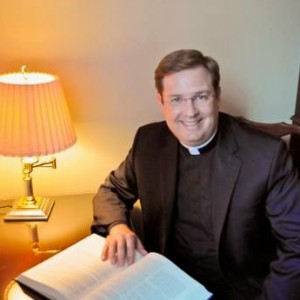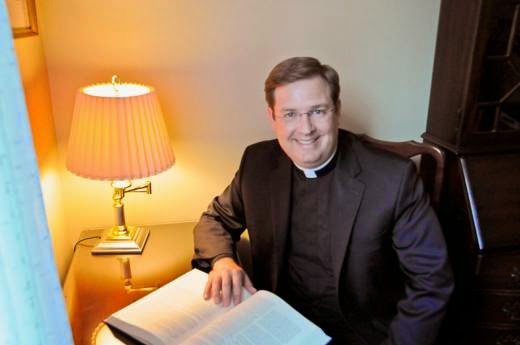Yesterday morning (about 8:30 a.m. local time, but 1:30 a.m. back in Kansas City), I arrived here in Rome. This is the beginning of a new chapter in my life; as you may recall, my bishop asked me and my classmate Carter to study at the North American College in Rome. This means that we will spend the next four years or so living and studying here in the Eternal City.
Here’s why.
In the 1990s, after Hanley graduated as a history major, he began to work as a high school teacher and then a staffer for a U.S. Senator. Shortly thereafter, he entered law school. During this time, he had begun to to feel called to become a seminarian, but was hesitant at first, because it “conflicted with my idea of the plan God had for me with what I wanted to do. I was happy with my career and its prospects, and I had a strong desire for a wife and family.“
Finally, in 1999, on the verge of his 28th birthday, he entered seminary for the Diocese of Arlington. After two years of pre-theology, he came here to the North American College for four years for his theology.
In 2005, he was ordained. Fr. Hanley’s first parish assignment was St. Mary’s in Old Town Alexandria, Virginia. There, the newly-ordained priest began a men’s prayer group. At the time, I was still a lukewarm Catholic in Topeka, Kansas, but this small act would change my life forever.
Like Fr. Hanley, I was also a history major. After graduating in 2007, I also went to law school, which brought me out to Washington, D.C. It wasn’t long before I was attending Mass at St. Mary’s in Old Town Alexandria. By this time, Fr. Hanley had moved on to another parish, but the men’s group was still going strong under the guidance of Fr. John De Celles (who I’ve written about before).
I didn’t hear about the men’s group right away. In fact, the first time I heard about it was during a Holy Hour. I was praying before the Blessed Sacrament when a guy I’d never met before approached me. He has a sort of surfer / Matthew McConaughey vibe to him, and he begins to speak to me by saying something along the lines of, “hey man, we have a men’s prayer group tomorrow, do you want to come?” I was a little taken aback since I had no idea who he was, but I agreed.
It was life-changing: under Fr. De Celles’ guidance, we formed a close-knit group of upwards of two dozen men who took their Catholicism very seriously. Eventually, Fr. De Celles was also moved to another parish, and a third great priest, Fr. Mick Kelly, replaced him.
One day, in men’s group, I mentioned off-handedly that a number of people had asked why I wasn’t discerning the priesthood. I had found this funny and a bit confusing, but it wasn’t anything I was taking very seriously. Fr. Kelly knew better. He told me the story of St. Ambrose, whose vocational call was also external: St. Ambrose (also a lawyer, incidentally) was a politician in Milan when a feud broke out between the Catholics and the Arians about who should replace the deceased bishop Auxentius. Ambrose delivered a speech which calmed everyone down, and both sides quickly acclaimed him as Auxentius’ replacement. At the time, this wasn’t anything Ambrose could have foreseen: he was still a catechumen, not even baptized yet. The point of Fr. Kelly’s story was that sometimes, for whatever reason (e.g., we’re not listening), the Holy Spirit won’t just speak within us, but will speak through others.
His advice was that I get a spiritual director and start taking discernment seriously. I did, and it ended me up here. My point is simple, and two-fold: (1) my “yes” to the will of God was built upon the “yeses” of countless other people before me, some of whom I’ve never even met, some of which have been dead for centuries; and (2) we can’t always see the good fruit that the good seeds we plant will produce. It was only by Providence that Fr. Hanley got to learn that the men’s group that he had started had helped guide several men into their vocations (in addition to me, another of our group is a Dominican novice, a third is preparing to head to Clear Creek Monastery in Oklahoma, and a few more are considering or have seriously considered the priesthood or religious life because of this group).
There’s another aspect to this, as well: saying “yes” to God might take us out of our comfort zones. What had been a tight-knit group living near one another in northern Virginia is now spread all over the country (and if you include me, even across the world).
In the parable of the Sower and the seed, the Sower scatters the seed in order for it to produce better fruit. It’s not a matter of sending it into chaos, as in the Tower of Babel, but a sending forth into the world, as at Pentecost. That’s what happened to the Apostles. Most of them didn’t get to stay in Jerusalem: they ended up everywhere from Spain (St. James) and India (St. Thomas).
But where were these seeds all together? In the hand of the Sower. And where shall the seeds be brought together again? When they die, are ground down, and become bread. So, to those that I leave behind (in D.C., in Kansas City, in Saint Louis, in Topeka, etc.), I’m heartened by the fact that we are all brought together in the hand of God. As we pursue the death-to-self that is the Christian life, let us remember that we are all one in the One Bread of Life. Let us see one another in the Eucharist and in glory, if not before.



Beautiful story!
I just have to quote this: “Unfortunately, it seems our Roman Catholic friends and relatives fail to understand this. Christ is our spiritual food and drink, not our physical nourishment” (from http://www.aomin.org/aoblog/index.php/2014/07/15/never-thirst-taking-jesus-literally-can-be-fatal/). How blind must be someone to believe that Catholics think that Jesus in the holy sacrament is our “physical nourishment”?
Joe – thank you so much for the note. The Men’s Prayer Group is still going strong. We are now under the guidance of Fr. Barnes, who just spent the last year in Rome with additional studies. Joe will be heading to the Trappist in KY in a couple of months. God Bless!
How beautiful! Thank you for sharing this!
Many blessings on you Joe!